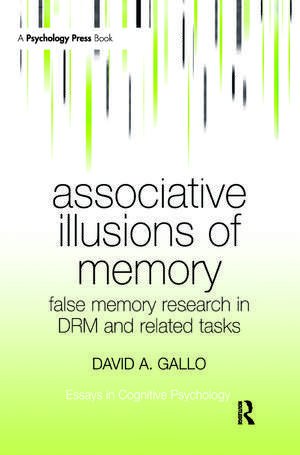Associative Illusions of Memory: False Memory Research in DRM and Related Tasks: Essays in Cognitive Psychology
Autor David Galloen Limba Engleză Hardback – 28 aug 2006
Associative Illusions of Memory provides an ambitious overview of this research area. Starting with the historical roots and major theoretical trends, this book exhaustively reviews the most recent studies by cognitive psychologists, neuropsychologists, and cognitive neuroscientists. The strengths and limits of various experimental techniques are outlined, and the large body of existing data is meaningfully distilled into a few core theoretical concepts.
This book highlights the malleability of memory, as well as the strategies and situations that can help us avoid false memories. Throughout the review, it is argued that these basic memory illusions contribute to a deeper understanding of how human memory works.
Din seria Essays in Cognitive Psychology
-
 Preț: 386.42 lei
Preț: 386.42 lei - 13%
 Preț: 348.02 lei
Preț: 348.02 lei -
 Preț: 461.50 lei
Preț: 461.50 lei -
 Preț: 467.44 lei
Preț: 467.44 lei -
 Preț: 459.71 lei
Preț: 459.71 lei - 22%
 Preț: 369.82 lei
Preț: 369.82 lei -
 Preț: 410.88 lei
Preț: 410.88 lei - 15%
 Preț: 541.72 lei
Preț: 541.72 lei - 18%
 Preț: 998.88 lei
Preț: 998.88 lei - 13%
 Preț: 302.64 lei
Preț: 302.64 lei - 15%
 Preț: 423.28 lei
Preț: 423.28 lei -
 Preț: 482.53 lei
Preț: 482.53 lei -
 Preț: 480.62 lei
Preț: 480.62 lei -
 Preț: 482.94 lei
Preț: 482.94 lei - 48%
 Preț: 233.06 lei
Preț: 233.06 lei -
 Preț: 462.60 lei
Preț: 462.60 lei - 42%
 Preț: 233.06 lei
Preț: 233.06 lei - 18%
 Preț: 1000.27 lei
Preț: 1000.27 lei -
 Preț: 393.63 lei
Preț: 393.63 lei - 41%
 Preț: 236.05 lei
Preț: 236.05 lei -
 Preț: 482.35 lei
Preț: 482.35 lei - 26%
 Preț: 765.23 lei
Preț: 765.23 lei -
 Preț: 460.69 lei
Preț: 460.69 lei -
 Preț: 343.77 lei
Preț: 343.77 lei -
 Preț: 314.59 lei
Preț: 314.59 lei -
 Preț: 190.51 lei
Preț: 190.51 lei - 17%
 Preț: 126.66 lei
Preț: 126.66 lei -
 Preț: 482.53 lei
Preț: 482.53 lei -
 Preț: 483.49 lei
Preț: 483.49 lei - 16%
 Preț: 130.21 lei
Preț: 130.21 lei -
 Preț: 465.39 lei
Preț: 465.39 lei - 31%
 Preț: 765.45 lei
Preț: 765.45 lei -
 Preț: 483.49 lei
Preț: 483.49 lei
Preț: 1013.72 lei
Preț vechi: 1236.25 lei
-18% Nou
Puncte Express: 1521
Preț estimativ în valută:
193.97€ • 202.52$ • 160.54£
193.97€ • 202.52$ • 160.54£
Carte tipărită la comandă
Livrare economică 05-19 aprilie
Preluare comenzi: 021 569.72.76
Specificații
ISBN-13: 9781841694146
ISBN-10: 1841694142
Pagini: 302
Ilustrații: 62
Dimensiuni: 152 x 229 x 25 mm
Greutate: 0.84 kg
Ediția:1
Editura: Taylor & Francis
Colecția Psychology Press
Seria Essays in Cognitive Psychology
Locul publicării:Oxford, United Kingdom
ISBN-10: 1841694142
Pagini: 302
Ilustrații: 62
Dimensiuni: 152 x 229 x 25 mm
Greutate: 0.84 kg
Ediția:1
Editura: Taylor & Francis
Colecția Psychology Press
Seria Essays in Cognitive Psychology
Locul publicării:Oxford, United Kingdom
Cuprins
Part I. Background. Associations and errors through history. Converging association tasks. Part II. Basic theories and data. Processes that cause false memory. Illusory recollection. Processes that reduce false memory. Additional study and test manipulations. Part III. Applications and data. Individual differences and generalizability. Development and aging. Neuropsychology and drugs. Neuroimaging and localization. Summary and conclusions.
Notă biografică
David Gallo is an Assistant Professort of Psychology at Chicago University. He previously was an NIH postdoctoral research fellow at Harvard University and he received his PhD in Experimental Psychology at Washington University in St. Louis, where he was awarded a graduate research scholarship from the American Psychological Foundation
Recenzii
“In Associative Illusions of Memory, David Gallo brings together a huge literature showing people misremembering events that are related to real events. The key memory distortion paradigm has been used with young and old, smart and not-so-smart, drunk and sober. We’ve learned a stunning amount about illusory recollection from this body of work, all meticulously and thoughtfully reviewed in one place. A bravura contribution to the memory field.” — Elizabeth Loftus, Distinguished Professor at University of California, Irvine, and author of Eyewitness Testimony
“Research on memory illusions has exploded during the past decade, and the field badly needs an integrative treatment of the topic. David Gallo has filled that need with this scholarly, well written, and timely volume. Rich in analysis and insight, this important book is required reading for anyone involved in research on memory or memory illusions.” — Daniel L. Schacter, William R. Kenan, Jr. Professor of Psychology, Harvard University, and author of The Seven Sins of Memory
“Research on memory illusions has exploded during the past decade, and the field badly needs an integrative treatment of the topic. David Gallo has filled that need with this scholarly, well written, and timely volume. Rich in analysis and insight, this important book is required reading for anyone involved in research on memory or memory illusions.” — Daniel L. Schacter, William R. Kenan, Jr. Professor of Psychology, Harvard University, and author of The Seven Sins of Memory
Descriere
This book highlights the malleability of memory, as well as the strategies and situations that can help us avoid false memories. Throughout the review, it is argued that research into these basic memory illusions contributes to a deeper understanding of how human memory works.
